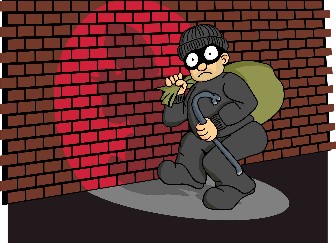Counterpoint: Why PleaseRobMe is Flawed Paranoia

I was going to post this as a comment on Russ’ post, but I have enough to say that it warrants one of these ranty point-counterpoint things we love so much on TMR.
PleaseRobMe is an ingenious little piece of social propaganda. It would be clever or interesting if it weren’t so fundamentally flawed as to expose itself as its own straw-man.
The graphic atop the page says everything you need to know about the proclivities of this page, but also its willingness to be deceptive. The vision is conjured of a Google Maps for Burglars, wherein people can immediately see homes that are documentably empty and round up the goods in said domiciles before the unwitting occupants have time to check their Twitter accounts. Brilliant, right?
Except of course, this is nothing like the service actually offered by the site. Instead, one gets the kind of mangled cloudy information one might expect from the Internet. One gets fake identities (Twitter accounts), no addresses whatsoever, no maps, and uncertainty as to what homes may or may not be occupied.
In fact, the only thing that this website is at all is a series of Twitter updates indicating that the given Twitterer is claiming to be somewhere other than their presumed residence.
Basically, PleaseRobMe relies on many fundamental assertions, each of which is laughably untrue:
1. Twitter accounts can be certifiably linked to real identities.
This is quite hit and miss. Some Twitterers choose to use their real names, which themselves may or may not be that unique. Many are inscrutable to anyone but their close friends or followers, which seems to me to be the whole point of Internet identities. It’s hard to get an exact proportion, but you could spend the whole time someone is around the corner at the cafe just trying to discern who the heck they actually are.
2. People’s addresses are easy to find on the Internet.
This is one of those bright-lines that still exists for a remarkable number of people on the Internet – people will share their cell number, e-mail address, and personal emotions pretty liberally, but most are guarded about their actual physical address. Sometimes you can do a phone-book search and get a direct hit – other times a name will be so common as to create chaos and confusion. Often people live their lives unlisted. Even more frequently, people will move enough that their listed identity is out-of-date.
3. Everyone lives alone.
This is perhaps the most fundamental and crushing flaw in the PRM assumption network. In fact, most people don’t live alone. And very few of these Twitter updates make it clear who is with the person on any given outing, let alone breaking down who may be left at home or whether one lives with the person one is on an outing with. People have spouses, boy- and girlfriends, roommates, friends crashing on couches. The idea that knowing one resident’s whereabouts could in any way mean the remaining home is vulnerable is patently absurd.
4. One can reliably predict how long someone will be away.
Again, hugely inconsistent. Yes, if the person says “Going to Chicago for two weeks” and their address is in Honolulu, that’s a safer bet than “At the Starbucks”. But most updates are “At the Starbucks”. And it’s hard to say whether the Starbucks is in Chicago, Delhi, or Honolulu. Or how long the person will be there. Or whether they updated at the end of their Starbucks run and are almost home already anyway.
But beyond all these basic assertions, there’s a more insidious issue in play. These sites, satirical or not, are designed to get people to think that privacy is being eaten by the Internet and that will obviously lead to more crime and victimization for those losing the privacy. While privacy may or may not be reducing from the Internet, there’s absolutely no causal link between reduced privacy and increased crime or victimization – certainly not in any way that this site is trying to illustrate. By creating an atmosphere of unjustified paranoia about Internet privacy, this site convinces people of threats that aren’t valid and thus has the moral fortitude of the Bush administration invading Iraq over mysterious 9/11-related claims.
But more interestingly, it’s hard to say whether privacy is even all that reduced by the Internet in the ways that PRM is discussing. After all, phone books have existed for decades and are accessible to any member of a community. (Presumably one has to be in the same community as someone one is hoping to rob from.) And while it may seem like an interesting novelty to have a Twitter update saying someone’s at a Starbucks, how is that different from being able to make the presumption that, say, the house is empty during work hours because most homes need two incomes these days? One would actually be much safer and better off looking up basic occupation information that was available publicly long before the Internet and then cross-referencing with a phonebook. You know, basic trappings of 1950’s America that use real identities instead of Twitter handles.
Then again, in the 1950’s, I guess it was mostly just men out working while the women stayed home and cleaned and waited for the kids to arrive. Because certainly no one wanted to do dastardly things to homemakers and rob them.
In any case, PRM’s entire point and argument dissolve upon scrutiny and simply amount to someone shouting in the middle of the street “OMG! The Internet! It’s coming to get us!” for no reason.




I was just going to comment about this on the other post, but I might as well do it here…
If someone were stalking me and wanted to know when I wouldn’t be home in order to rob my house, it would likely be considerably easier to, I don’t know, sit outside my house in a sketchy van and watch me leave. And if the purported threat isn’t specifically targeting me, but just looking for people who broadcast that they’re away from home, wouldn’t it be easier to – again – sit in a sketchy van on a random street and watch people leave their houses?
Plus everything Storey said.
Did you read more than the tagline of the website?
It is not actually intended as a tool for burglars, merely a display of potentially compromising status messages.
Plus, I think the arguments you posted never actually occur to the vast majority of social networkers. Virtually no one says to themselves, “well, I have roommates and a security system, so it’s ok to post my location on the internet.” PleaseRobMe’s intention is to make users think before they potentially compromise themselves.
Though I do agree, in part, that burglary isn’t a particularly huge threat.
The real threat from such compromised information is identity theft. Over 10 million Americans were victims of identity theft last year. It is now the most common crime in America, and it is a direct consequence of poor privacy controls on the internet — whether you’re talking about social security numbers, credit card information, passwords, home addresses, etc.
So, before we invoke Bush-era paranoia claims, I think you should take a hard look at the actual, unprecedented, crime wave caused directly by a lack of internet privacy.
A – It’s not just the tagline of the website… the entire site is designed to promote fear about being robbed. Look at the graphic. Look at the name of the website. Look at the content, which simply says a person is out of their house.
B – Absolutely nothing about the site has anything to do with identity theft. What does knowing someone’s at a Starbucks have to do with being able to steal their identity? The only real danger of identity theft is in the Starbucks employee swiping your credit card, since that’s a point of vulnerability. If the site posted every time someone posted overly private information on their Twitter, then maybe you’d have a match on what this site is trying to create awareness about.
C – Identity theft has an enormous advantage over brick and mortar theft: it’s largely victimless/reparable. Most every credit card company and bank covers provable losses from identity theft and you have to really be asleep at the wheel to fall for something you can’t prove and get your money back from. Yes, banks and insurers lose money. I’m not exactly weeping.
The site managers absolutely have a point that if people are going to take basic precautions like locking their doors, and leaving the porch light on, they may as well not broadcast their whereabouts to the internet. For people who have zero fear of burglary at all times, I agree, the website is useless.
No, the site doesn’t address identity theft. But social networks are easily tapped for personal information — mainly by corporations, but also for potential password or secret keyword phishers. If you’ve ever called your phone company, for example, they ask you a basic question or two to validate your identity, usually your home address and telephone number.
Most identity theft isn’t caught within the first 60 days, the time period that people are federally protected from damage. Even if the victim eventually recoups their losses, they spend countless hours and hefty sums of money in litigation to recover their relative shit. It’s like someone dismissing your moving truck crash. Yes, you recouped the cost via an insurance company, but it took tons of hours of phone calls and collecting documents to remedy — and a good amount of grief, even without thinking of the sentimental value of the items themselves.